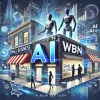
By Elke Porter | WBN Ai | July 1, 2025
Subscription to WBN and being a Writer is FREE!
For years, search engines like Google indexed websites and drove traffic to publishers, who monetized this traffic through advertising. However, AI crawlers, used by companies like OpenAI and Anthropic to gather data for training models or generating responses, often collect vast amounts of content—text, images, and articles—without sending significant traffic back. Cloudflare reports that OpenAI’s crawler, for example, scrapes 1,500 pages for every visitor referred, compared to Google’s 18:1 ratio. This imbalance has raised concerns about the sustainability of online content creation, as publishers receive little compensation for their data.
Cloudflare, which handles approximately 20% of global web traffic, announced its "Pay per Crawl" initiative on July 1, 2025, to address these concerns. This private beta marketplace allows website owners to control and monetize AI crawler access. By default, new Cloudflare-hosted sites now block all AI crawlers, requiring explicit permission for access. Publishers can choose to block crawlers entirely, allow specific ones (e.g., for partnerships), or charge micropayments per crawl using HTTP status code 402 ("Payment Required").
Cloudflare verifies crawler identities through partnerships with AI companies and uses tools like public key cryptography (e.g., Ed25519) to prevent spoofing. Publishers can see which bots access their content and for what purpose, such as AI training or search indexing.
The initiative aligns with principles of ethical data use, including:
- Obtaining explicit permission before scraping, often through APIs or formal agreements.
- Respecting robots.txt and site-specific rules, with Cloudflare enforcing compliance for blocked sites.
- Limiting data collection to reduce server strain.
- Providing transparency by identifying crawlers and their purposes.
- Offering compensation through micropayments, as enabled by Pay per Crawl.
Over 20 major publishers and organizations, including Condé Nast, The Atlantic, TIME, Gannett, BuzzFeed, Universal Music Group, and Stack Overflow, support this permission-based model. Publishers must now decide whether to block all AI crawlers, allow select ones, or participate in the paid marketplace. Cloudflare acts as the Merchant of Record, handling transactions, though specific pricing and revenue details for publishers are not publicly disclosed.
The initiative responds to a decline in search-driven traffic (e.g., Google’s crawl-to-referral ratio dropping from 6:1 to 18:1) and aims to give publishers control over their content. However, its impact is limited to Cloudflare’s 20% of web traffic, and existing domains must opt in to enable default crawler blocking. Smaller publishers may see limited revenue due to low crawl volumes, and non-compliant bots could evade restrictions, though Cloudflare mitigates this by routing unverified crawlers to decoy pages.
Cloudflare’s CEO Matthew Prince and Chief Strategy Officer Stephanie Cohen state that Pay per Crawl seeks to balance creator rights with AI innovation. While supported by major publishers and platforms like Reddit, the system’s broader adoption and effectiveness depend on AI company compliance and industry-wide cooperation. Some sources suggest it could increase costs for AI firms or push them to alternative data sources, while others note that small publishers may face challenges in leveraging the system due to technical complexity or limited bargaining power. On July 1, 2025, Cloudflare’s stock fell 6.6% following the announcement, possibly reflecting investor concerns about its market impact.
TAGS: #Pay Per Crawl #AI Web Scraping #Cloudflare #EthicalAI #WebPublisherRights #DataMonetization #WBN AI Edition #Elke Porter
Connect with Elke at Westcoast German Media or on LinkedIn: Elke Porter or contact her on WhatsApp: +1 604 828 8788. Public Relations. Communications. Education


